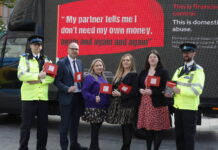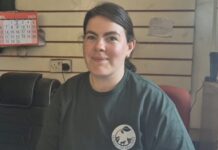Public Health England has relaunched its campaign alerting people to the dangers of a stroke.
The campaign encourages people to act F.A.S.T when someone is suffering from a stroke by checking their face, arms and speech.
If you spot any of these three symptoms, it is time to call 999.
Juliet Bouverie, the Chief Executive of the Stroke Association said: “Every five minutes, someone in the UK will have a stroke.
“Stroke kills tens of thousands and leaves others with complex and severe disability every year.”
Many people with suspected stroke are believed to have put off calling 999 in the past year over fears of catching COVID-19 or becoming a burden on the NHS.
Ms Bouverie said: “Now we know that people died as a consequence, and those who survived could be living with more severe disability than they otherwise would.
“Recovery is tough, but with the right specialist support and a ton of courage and determination, the brain can adapt after stroke,” she added.
Steve Moulton, the Practice Manager of Burscough Neuro Physiotherapy & Rehabilitation Centre, believes that stroke can start to occur earlier than these symptoms.
“People can feel dizzy, hot or anything like that a few days before, it’s only when things progress, it feels more like a stroke,” he said.
Neurotherapy aims to treat stroke by teaching the brain to relearn movements.
The pandemic has meant that many stroke patients have suffered through a lack of therapy.
Mr Moulton said: “We had to make a decision that if people didn’t have the physiotherapy, they’d end up going into hospital where there’s a massive chance of getting COVID.
“So, we carried on treating domiciliary patients and most severe patients that needed the treatment and then the other patients we kept in touch with via zoom meetings and telephone calls.”
Recovery from stroke can vary from patient to patient.
“If we pick a stroke patient up who has had a stroke six months ago, and is sat at home in a darkened room, being hoisted onto the toilet and we can work with that person to get them to independently transfer to the toilet and back again.
“That’s like you or I winning six million pounds on the lottery,” Mr Moulton said.
A young boy at the centre who suffered from a stroke has learned to draw with his left hand following a stroke on his right side.
“When he gets to 20, he might have the stroke behind him and he’s moving forward normally, but everyone’s different.”
Mr Moulton stressed that there is after care for stroke patients.
“A lot of people just don’t know it’s out there.”
“That is the saddest thing about it when we pick up new patients, and we’ll help them six months down the line, I don’t know how many more people are sat in that darkened living room doing nothing,” he added.
If you suspect that someone is having a stroke, call 999.












